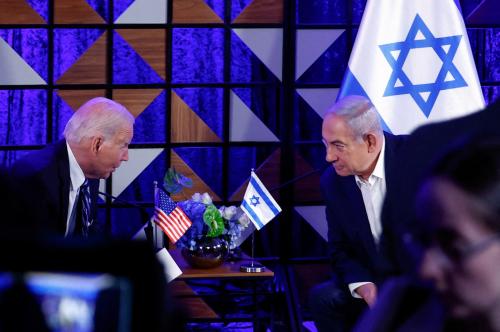Should the United States aim to achieve a world free of all nuclear weapons? In one sense, the question is trivial – nuclear disarmament has been a stated aim of the United States since the dawn of the nuclear age. And the United States also committed to working toward this end when it signed the nuclear Non-Proliferation Treaty in 1968.
But in another sense, the question is fundamental. Although successive administrations (at least until the current one) have mouthed the words affirming this objective, few have actually made this commitment an organizing principle of their nuclear weapons policies. That may be about to change. Earlier this week, Senator Barack Obama pledged that as president he would say: “America seeks a world in which there are no nuclear weapons.” Former senator John Edwards has also pledged to lead an international effort to eliminate nuclear weapons, as has New Mexico Governor Bill Richardson.
And it isn’t just presidential candidates who are talking about a nuclear-free world. So are former statesmen like Henry Kissinger, George Shultz, Bill Perry, and Sam Nunn. Writing in The Wall Street Journal last January, they urged that the United States set the goal of a world free of nuclear weapons, and proposed specific actions to that end.
Nearly 20 years after the Cold War ended, the time has come to make a concerted effort to verifiably rid the world of all nuclear weapons. The United States must start by recognizing that the threats it confronts have changed and so, consequently, has the role and purpose of our nuclear weapons. During the Cold War we worried about the possibility, however small, of a disarming bolt-out-of-the-blue attack on our nuclear forces. That is no longer a realistic possibility. We also confronted a superior conventional foe in Europe and elsewhere that we sought to deter by threatening nuclear escalation. Today, our overwhelming conventional forces can defeat any nation, anywhere on earth.
Tomorrow’s nuclear threats are different. They are that unstable regimes or, worse, nihilistic terrorists get their hands on a bomb and use it. This threat is becoming more real as nuclear technology and materials spread around the world. The first order of business must be to ensure that all the nuclear weapons and materials in Russia and elsewhere are safe and secure. While recognizing the threat of loose nukes and materials, this administration has done far too little to make sure this happens. The next administration must do better.
The second order of business, though, is to reduce the salience of nuclear weapons in order to ease the road to their elimination. The only reason the United States should maintain nuclear weapons is because others have them. There cannot be another purpose. We don’t need them to deter a non-nuclear attack on ourselves or our allies; our conventional forces can deal with those contingencies. We certainly don’t need them to attack some far-away or deeply buried targets, because there isn’t a target whose destruction is worth breaking the 62-year-old taboo against using a single nuclear weapon.
Given this limited role for nuclear weapons, there is much that the United States can do to lift the dark nuclear shadow over the world. It can sharply reduce its nuclear stockpile to 1,000 weapons or less, if Russia agrees to go down to the same level. It can eliminate tactical nuclear weapons to underscore that it understands that a nuclear weapon is a nuclear weapon, no matter its size, yield, range, or mode of delivery. It can agree never to produce highly enriched uranium and plutonium for weapons purposes, and accept the need for intrusive verification if other states agree to end such production as well. It can commit never again to test a nuclear device, and ratify the Comprehensive Test Ban Treaty.
If the United States were to do all these things, it would make clear, to our citizens and the world, that it is serious about tackling the nuclear danger. It would reestablish the nation as the leader of the global nuclear nonproliferation movement. Above all, it would make the world a much safer place.



Commentary
Op-edA Nuclear-Free World
October 5, 2007